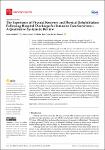The Experience of Physical Recovery and Physical Rehabilitation Following Hospital Discharge for Intensive Care Survivors— A Qualitative Systematic Review
| dc.contributor.author | Goddard, S | |
| dc.contributor.author | Gunn, H | |
| dc.contributor.author | Kent, B | |
| dc.contributor.author | Dennett, R | |
| dc.contributor.author | Goddard, S | |
| dc.date.accessioned | 2024-01-09T11:03:30Z | |
| dc.date.available | 2024-01-09T11:03:30Z | |
| dc.date.issued | 2024-01-09 | |
| dc.identifier.issn | 2039-4403 | |
| dc.identifier.uri | https://pearl.plymouth.ac.uk/handle/10026.1/21886 | |
| dc.description.abstract |
Background: Over 120,000 people in the UK survive critical illness each year, with over 60% of these experiencing mobility issues and reduced health-related quality of life after discharge home. This qualitative systematic review aimed to explore critical care survivors’ perceptions, opinions, and experiences of physical recovery and physical rehabilitation following hospital discharge. Methods: This review followed the Joanna Briggs Institute (JBI) methodology with the Preferred Reporting Items for Systematic Reviews and Meta-Analyses (PRISMA) and was conducted between January 2020 and June 2022. The search was conducted using the following databases: Embase, CINAHL, Medline Ovid, Cochrane, and the Joanna Briggs Institute, and sources of grey literature were searched for eligible studies. Qualitative studies focused on physical rehabilitation or recovery, involving adult survivors of critical illness who had been discharged from hospital. Results: A total of 7 of 548 identified studies published in 2007–2019 were eligible for inclusion. The findings indicate that qualitative evidence around the experiences of physical recovery and rehabilitation interventions following discharge home after critical illness is limited. Three synthesised findings were identified: ‘Positivity, motivation and hope’; ‘Recovery is hard and patients need support’; and ‘Patients experience challenges in momentum of physical recovery’. Conclusions: Survivors struggle to access healthcare professionals and services following discharge home, which influences the momentum of physical recovery. Supervised exercise programmes had a positive impact on the perception of recovery and motivation. However, ‘simple’ structured exercise provision will not address the range of challenges experienced by ICU survivors. Whilst some factors influencing physical recovery are similar to other groups, there are unique issues experienced by those returning home after critical illness. Further research is needed to identify the support or interventions survivors feel would meet their needs and assist their physical recovery. This study was prospectively registered with Prospero on 3/2/2020 with registration number CRD42020165290. | |
| dc.publisher | MDPI | |
| dc.title | The Experience of Physical Recovery and Physical Rehabilitation Following Hospital Discharge for Intensive Care Survivors— A Qualitative Systematic Review | |
| dc.type | Journal Article | |
| plymouth.journal | Nursing Reports | |
| plymouth.organisational-group | |Plymouth | |
| plymouth.organisational-group | |Plymouth|Faculty of Health | |
| plymouth.organisational-group | |Plymouth|Faculty of Health|School of Health Professions | |
| plymouth.organisational-group | |Plymouth|Users by role | |
| plymouth.organisational-group | |Plymouth|Users by role|Academics | |
| plymouth.organisational-group | |Plymouth|Users by role|Post-Graduate Research Students | |
| dcterms.dateAccepted | 2024-01-03 | |
| dc.date.updated | 2024-01-09T11:03:29Z | |
| dc.rights.embargodate | 2024-01-31 |


